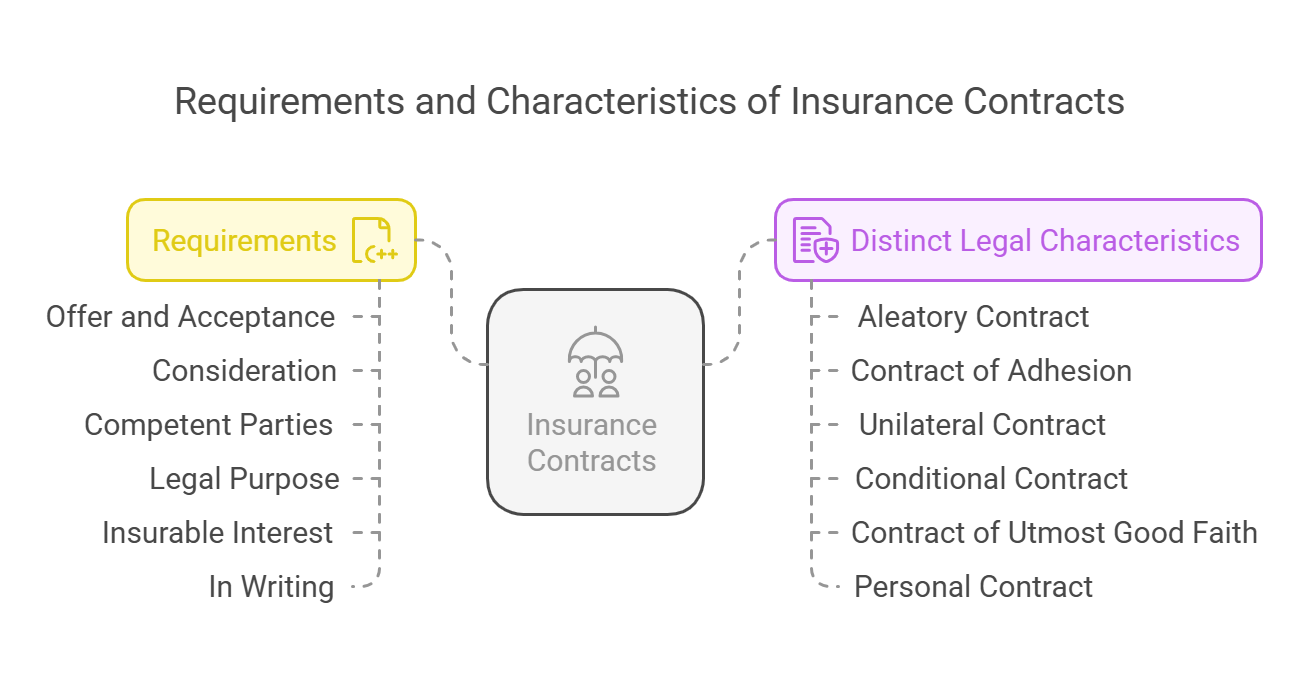Requirements of an Insurance Contract
For an insurance contract to be legally valid and enforceable, it must meet specific requirements. These requirements ensure that the agreement is clear, fair, and legally sound.

-
1. Offer and Acceptance:
- Explanation: A valid contract requires a clear offer by one party (the applicant) and an unqualified acceptance of that offer by the other party (the insurer).
- Example: The applicant submits a completed insurance application with all necessary information. The insurer then reviews the application, and if approved, issues an insurance policy. The policy issuance signifies acceptance.
- Note: A counteroffer (e.g., the insurer offering different terms than those applied for) must be accepted by the applicant to form a contract.
-
2. Consideration:
- Explanation: Consideration is the value exchanged by each party to the contract. The insured's consideration is the premium payment (or a promise to pay the premium), and the insurer's consideration is its promise to pay benefits if a covered loss occurs.
- Note: Consideration must be adequate, meaning it must be something of value.
-
3. Competent Parties:
- Explanation: All parties entering into the contract must be legally competent. This generally means that they must be of legal age, of sound mind, and not under the influence of drugs or alcohol that would impair their judgment.
- Note: Minors and individuals declared legally incompetent generally cannot enter into binding contracts.
-
4. Legal Purpose:
- Explanation: The purpose of the insurance contract must be legal and not against public policy.
- Example: A contract to insure an illegal activity (e.g., drug trafficking) would be unenforceable.
-
5. Insurable Interest:
- (See detailed explanation in the previous response covering Fundamental Legal Principles)
- Briefly: The insured must have a financial stake in the subject matter of the insurance. They must stand to suffer a financial loss if the insured event occurs.
-
6. In Writing:
- Explanation: Although some contracts can be oral, insurance contracts are typically required to be in writing to be enforceable. This provides clear evidence of the terms of the agreement, preventing misunderstandings and disputes.
- Note: The written document is the insurance policy itself.
Distinct Legal Characteristics of Insurance Contracts
Insurance contracts possess unique legal characteristics that distinguish them from other types of contracts. These characteristics arise from the specific nature of insurance as a risk-transfer mechanism.
-
1. Aleatory Contract:
- Explanation: An aleatory contract is one where the outcome depends on chance. The value exchanged by the parties is unequal and depends on whether a covered event occurs.
- Example: An insured may pay premiums for many years without ever experiencing a covered loss, meaning the insurer receives more value than the insured. Conversely, an insured may experience a large loss shortly after purchasing insurance, meaning the insured receives more value than the insurer.
-
2. Contract of Adhesion:
- Explanation: An insurance contract is typically a contract of adhesion, meaning that the terms are drafted by the insurer, and the insured has little or no opportunity to negotiate the terms. The insured essentially "adheres" to the terms offered by the insurer.
- Implication: Any ambiguities in the policy language are generally interpreted in favor of the insured.
-
3. Unilateral Contract:
- Explanation: A unilateral contract is one where only one party makes a legally enforceable promise. In an insurance contract, the insurer makes a legally enforceable promise to pay benefits if a covered loss occurs. The insured does not make a legally enforceable promise to pay premiums, but if they stop paying premiums, the insurer can cancel the policy.
- Note: The insured has the right to discontinue the contract by not paying premiums, but the insurer is obligated to fulfill its promise if the insured has met all conditions.
-
4. Conditional Contract:
- Explanation: The insurer's obligation to pay benefits is conditional upon the insured fulfilling certain conditions, such as paying premiums, providing timely notice of a loss, and cooperating with the insurer's investigation.
- Example: If the insured fails to pay premiums, the insurer is not obligated to pay benefits. If the insured fails to provide timely notice of a loss, the insurer may deny the claim.
-
5. Contract of Utmost Good Faith (Uberrimae Fidei):
- (See detailed explanation in the previous response covering Fundamental Legal Principles)
- Briefly: Both the insurer and the insured have a duty to act honestly and disclose all material information relevant to the insurance contract.
-
6. Personal Contract (with Exceptions):
- Explanation: Insurance contracts are generally considered personal contracts because they cover a specific individual or property. However, some types of insurance (like life insurance) allow the policy owner to transfer ownership.
- Implication: The insurer underwrites the risk based on the specific characteristics of the insured (or the insured property).

No Comments